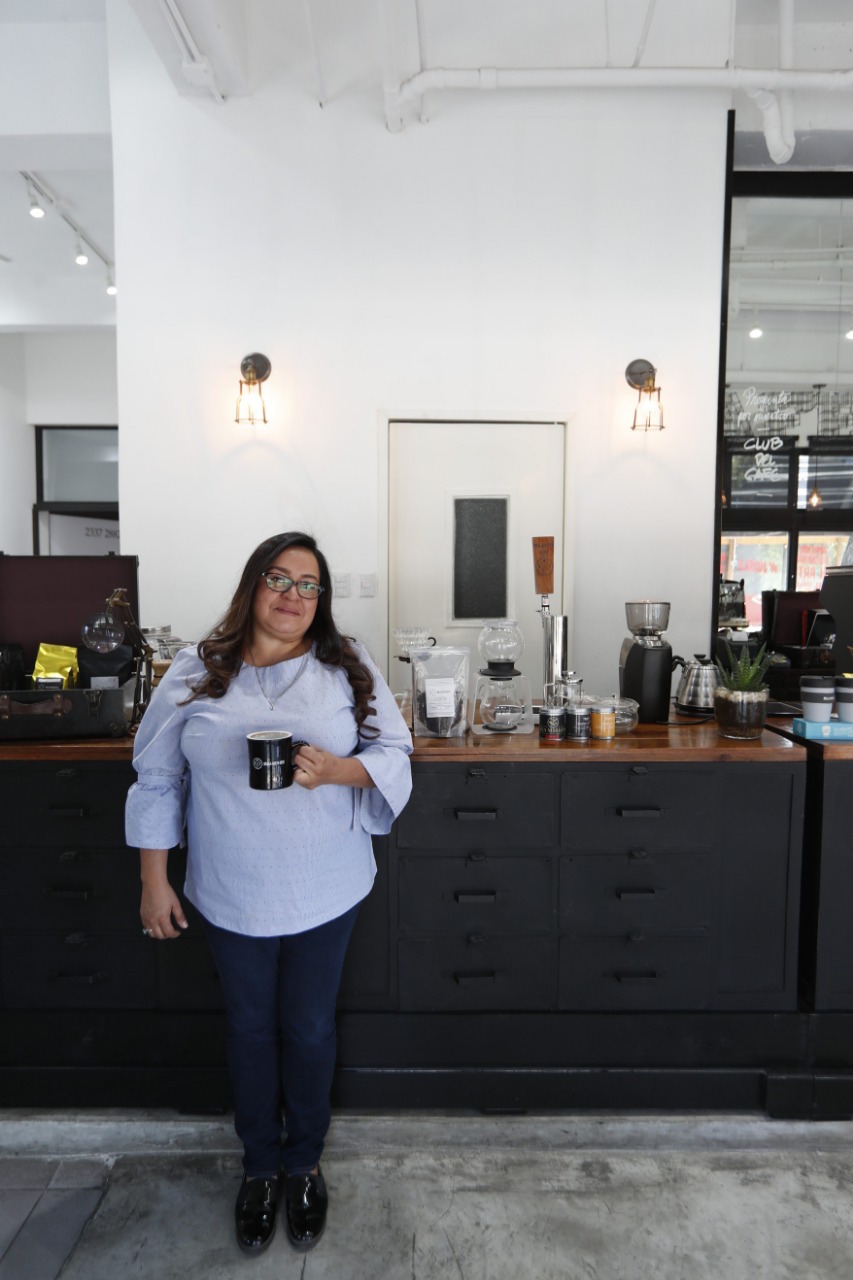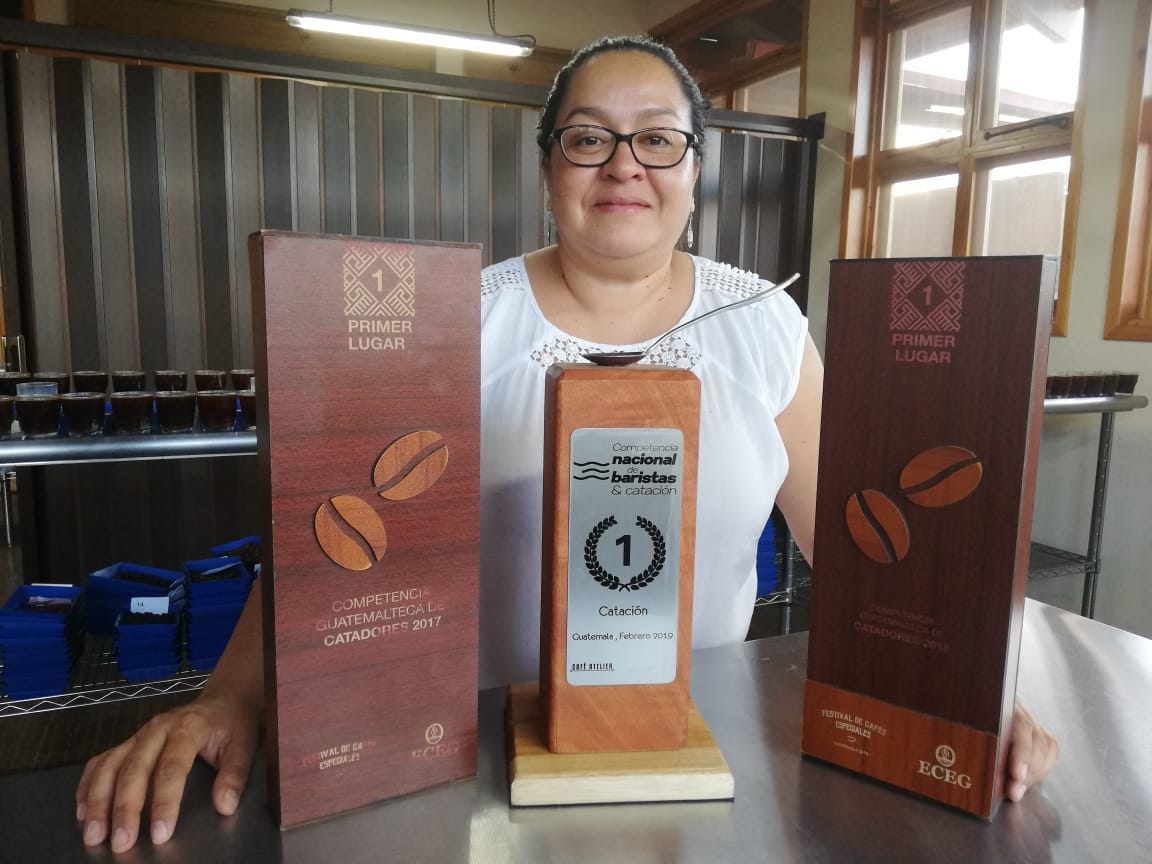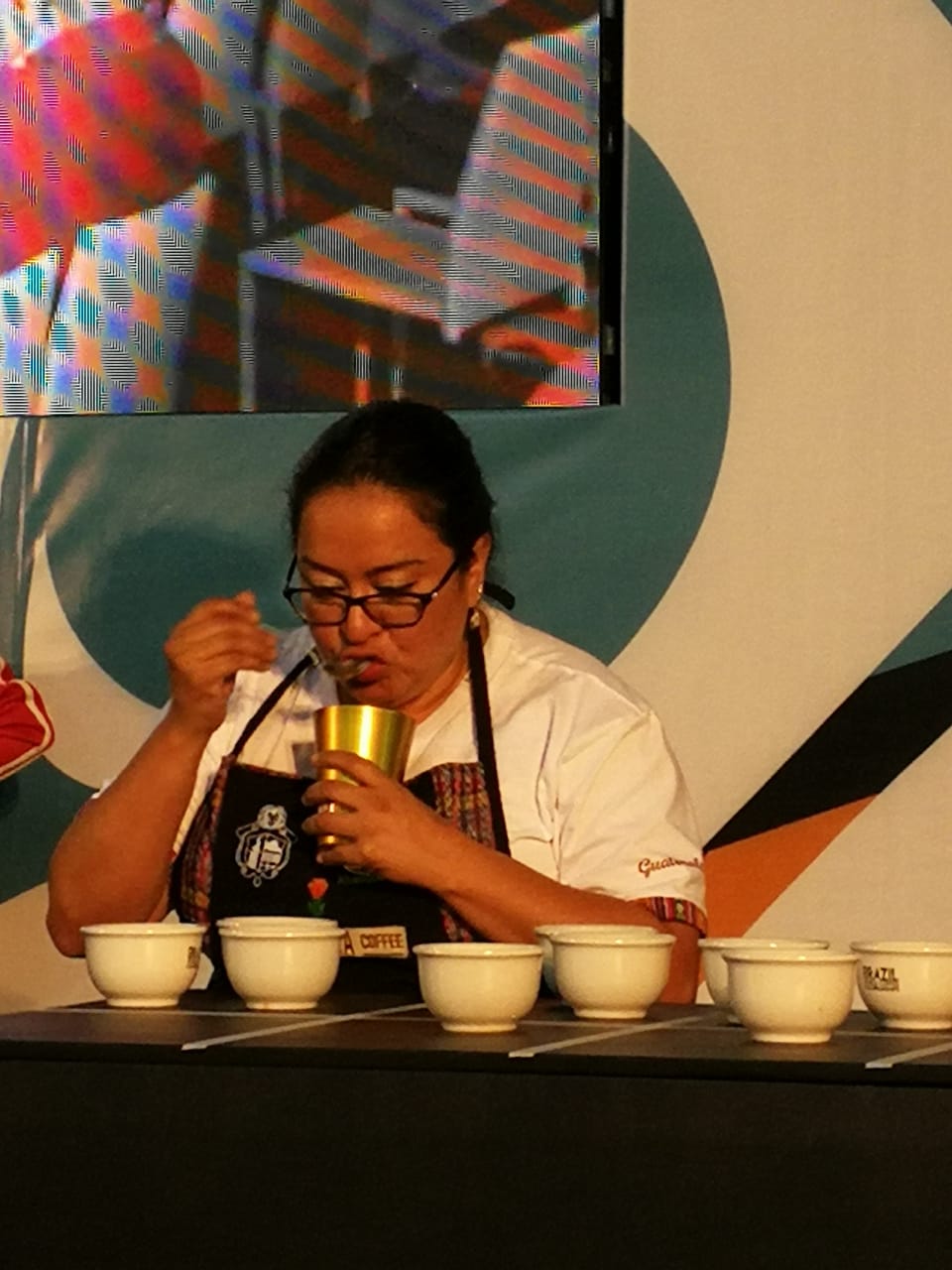(Editor’s note: This is part of a series of interviews featuring women taking part in the inaugural Women in Coffee Project panel discussion next month in New York City. The interviews have been conducted in English and in Spanish by professional coffee roaster Women in Coffee Project Founder Amaris Gutierrez-Ray. For more on Gutierrez-Ray, the WICP and its upcoming events, see the original post in the series, featuring Eleane Mierisch.The following interview with Dulce Barrera has been translated from Spanish. Read the original here.)
Amaris Guttierez-Ray: Hola Dulce! What’s your title? How long have you worked in your role? And how did you get into coffee? (This is like a mini mini bio!)
Dulce Barrera: My name is Dulce Elena Barrera Giron. I’m 40 years old and I have worked for Bella Vista (Guatemala) for 17 years. I started in 2002 in administration, then in 2005 Luis Pedro gave me the opportunity to work in the small cupping lab. That’s where I fell in love with cupping! In 2016, in my first cupping competition, I landed in seventh place, so I couldn’t advance to finals. Then, in 2017, I competed again and won first place in the [Guatemala National Cup Tasters Championship] — and I was the first woman to win that prize — so I advanced to Budapest. Then, in 2018, I won again and advanced to Brazil, and in 2019 I won for the third time, so I will be advancing to Germany in June.
AGR: What are your personal goals for yourself in your career? What about just the immediate goals for the next year? What about 10 years from now?
DB: I hope to win the World Cup Taster’s championship in Germany, in hopes that coffee consumers will pay more attention to our Guatemalan coffees. I hope this coming year to be able to get a coffee shop, and to be able to compete one more time. I see myself within 10 years cupping coffees from everywhere in Guatemala. I want to help increase the quality of the coffee growers in Guatemala. I hope my coffee shop gets good recognition. I hope to travel and cup coffees in the Cup of Excellence in different countries. I hope to grow my tiny school [for] cupping and how to be a barista, and I hope to continue to work in Bella Vista, which has been my own personal school all these years.
AGR: Tell us about some women who have given you inspiration in your work and your life.
DB: The truth is that in my work I haven’t known a single woman that has inspired me — before, this job was only for men. But in my life, I do have a person [who] has proven to be an example of how to work hard and never surrender, and that’s my mom. She is a woman who has always worked to support her three children, and without studying or anything, she has never given up — and at the age of 66 she’s still working! She’ll still never give up.
AGR: Have you encountered any obstacles in your work with anyone because of your gender? Did you come up with any personal solutions in those instances, if any? Or, knowing you, did you find a way to speak about them candidly?
DB: Luis Pedro Zelaya — both father and son since they have the same name — have always taken account of Guatemalan women and they don’t have any problems working with us women. On the contrary, they always support us however they can, they are always there to help not only me, but also the other women who work in the business.
AGR: If someone were to ask you “Why should we talk about women in coffee?” what would you say?
DB: Because they’re in the whole process of coffee! If I talk about a coffee plant, I think of a woman working in planting that seedling; if I talk about fertilization of coffee, I see a woman applying fertilizer to each coffee tree; if I talk about picking cherry, I see that woman starting early in the morning to pick the ripe coffee cherries. In reality, women are totally and wholly involved in coffee, even up to the point where we serve our families and friends a cup of coffee with hospitality and passion. In Guatemala, 42% of the workforce of coffee growers are women.
AGR: Since we are looking to build new systems to talk about supporting women in coffee, and you have spent a lot of time what advice would you give us? If we wanted to do something totally new, should we pay attention to how to do that respectfully? Should we focus on giving help or priority toward education here? What are ways to empower women, or to give them more power in their lives and work?
DB: I have known some organizations that help women and train them in different ways, and I think it’s a good way to show exploited women their full potential. Here, only a few women go on to study at university, and they need to know they can go on to find other jobs that can empower them. Like in coffee, they can go on to learn how to roast, to cup, to become a barista — the opportunities in the field of coffee growing are very wide.
AGR: If you could go tomorrow to another coffee-producing country to see something, what country would it be and why?
DB: I would love to get to know Ethiopia. It’s the birthplace of coffee, and the coffees from Ethiopia are some of the world’s favorites, and also my favorites. But I would like to live that moment of enjoying a cup of coffee in the place where it’s grown, to learn and understand its many processes — for me, that is a magical place for coffee.
AGR: We know you have spent a considerable amount of time and energy on building a strong team. Could you tell us more about that work? How do you all work together and how do you give them support? How do you function as an organization of people, both within and apart from the harvest times?
DB: I think that our team functions well because we all know our own roles and if anyone misses something we can do the work to pick it up and continue. Luis Pedro has delegated responsibilities to each of us that we have to do, and we have converted ourselves into experts because of that trust. Every harvest gives us each something new to learn, and we make changes where we find our weaknesses. The good thing is that, if someone fails or something like that, we all continue learning from each other and we can adjust and adapt to solve it together. That way we don’t lose time because of an error. It’s better to solve it together. The atmosphere of our work is one of friendship and companionship, and respect above all, and we strive to help each other the best we can.
AGR: What’s the first thing you want to eat when you get to New York? Bagels? Pizza? European cheese?
DB: Bagels!
Amaris Gutierrez-Ray
Amaris Gutierrez-Ray is the Roasting Operations Manager for Joe Coffee Company in New York City. She is also the founder of the Northeast Roaster Forum and the Women in Coffee Project. A lover of stories and the people that tell them, she has always been interested primarily in the culture and communities of this world in coffee.









Comment